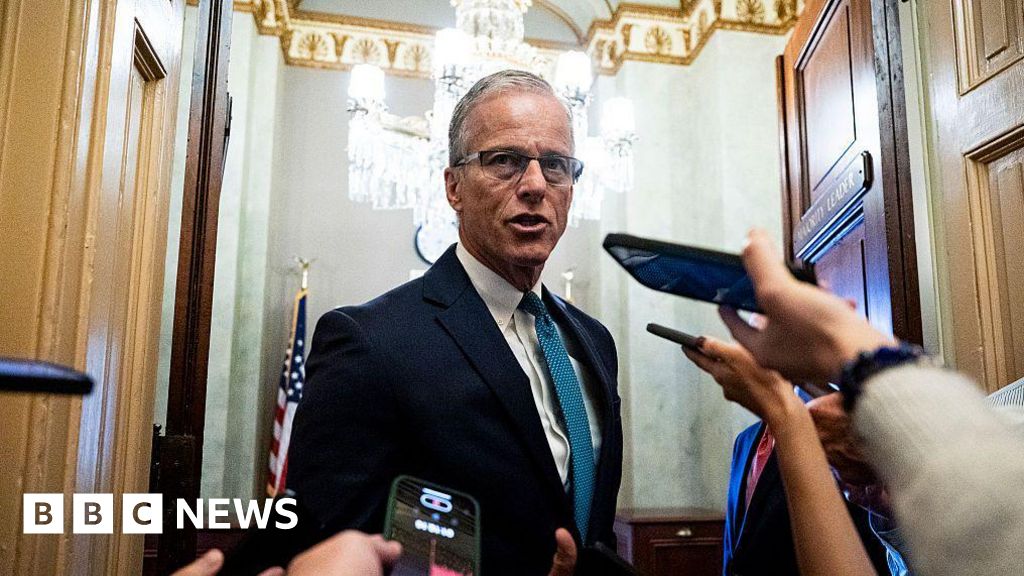
Senate Republicans have narrowly advanced a sprawling budget bill that is pivotal to President Donald Trump’s second-term agenda ahead of a self-imposed 4 July deadline.
The Senate moved 51-49 to open debate on the bill. Two Republicans joined Democrats in opposing the move.
Republican party leadership had been twisting arms for the initial vote on what Trump calls his “Big Beautiful Bill” on Saturday, after the release of its latest version – all 940 pages – shortly after midnight.
Republicans were divided over how much to cut welfare programmes in order to extend $3.8tn (£2.8tn) in Trump tax breaks. The proposed cuts would strip millions of America’s poorest of health insurance.
Trump declared the progress a “great victory” in a late-night social media post.
He attacked Republicans Rand Paul of Kentucky and Thom Tillis of North Carolina, who rejected the bill, writing of Paul: “Did Rand Paul Vote ‘NO’ again tonight? What’s wrong with this guy???”
Paul opposes a provision in the bill that would raise the US debt limit. Tillis says the legislation would cost his state billions of dollars in healthcare funding. He cited the impact on Medicaid, the healthcare programme relied on by millions of elderly, disabled and low-income Americans.
However, the bill did win over some Republicans who had expressed scepticism, including centrist Republicans Lisa Murkowski of Alaska and Susan Collins of Maine. Ron Johnson of Wisconsin initially voted against it, but changed his vote at the end of the session.
Vice-President JD Vance had travelled to the Capitol on Saturday night to offer a tiebreak vote in the Senate, where the vice-president has the deciding vote in the event of deadlock.
Party leaders were ultimately able to negotiate majority support without his help, but the bill’s fate on the Senate floor remains uncertain and Republicans in the chamber continue to quarrel over its provisions.
A final vote is expected in the coming days.
The bill needs a simple majority to clear the Senate. With Republicans holding 53 seats out of 100, plus Vance’s tiebreaker, the party can only afford three defections.
If passed in the Senate, the bill would go back to the House of Representatives for approval. Republicans can only stand to lose a handful of votes there – but some in the House have concerns over the Senate’s changes to the bill, which was adjusted to appease backbench Republican holdouts.
Democrats have said they will drag out the voting process in protest against the bill.
Senate Minority Leader Chuck Schumer has insisted that Republicans must read out the nearly 1,000 pages of text before the Senate can begin debate and potentially take up a final vote.
“Senate Republicans are scrambling to pass a radical bill released to the public in the dead of night, praying the American people don’t realise what’s in it,” Schumer said. “If Senate Republicans won’t tell the American people what’s in this bill, then Democrats are going to force this chamber to read it from start to finish.”
In a memo sent to Senate offices, the White House endorsed the latest revisions to the bill and called for its passage.
The memo reportedly warned that failure to approve the budget “would be the ultimate betrayal”.
Senator Patty Murray, a Washington state Democrat, took to social media on Saturday to argue that the bill contains “the largest healthcare cuts in history”.
Another critic of the bill is Elon Musk, who wrote on X on Saturday that the latest iteration of the bill “will destroy millions of jobs in America and cause immense strategic harms to our country”.
Musk took issue with taxes the bill proposes on solar and wind energy projects.
The latest draft of the spending bill still contains some of its core components: tax cuts that Trump campaigned on, such as a tax deduction on Social Security benefits, and the elimination of taxes on overtime work and tips.
It would also extend tax cuts passed by Republicans in 2017.
More contentious measures are still in place, including restrictions and requirements on Medicaid. Democrats have heavily criticised this piece of the bill, saying it will limit access to affordable healthcare for millions of Americans.
The Congressional Budget Office estimates that 7.8 million people would become uninsured under the cuts.
The draft bill incorporates input from the Senate parliamentarian, an official who reviews bills to ensure they comply with the chamber’s procedures.
It includes an increase in funding for rural hospitals, after some Republican moderates argued the original proposal would harm their constituents.
There are also changes to the Supplemental Nutrition Assistance Program (Snap), which provides food benefits to low-income Americans.
Under the latest bill, Alaska and Hawaii would be temporarily exempt from a proposed requirement for some states to start footing the bill for the programme, which is currently fully funded by the federal government.
The revision comes after Alaska’s two Republican senators pushed for an exemption.



